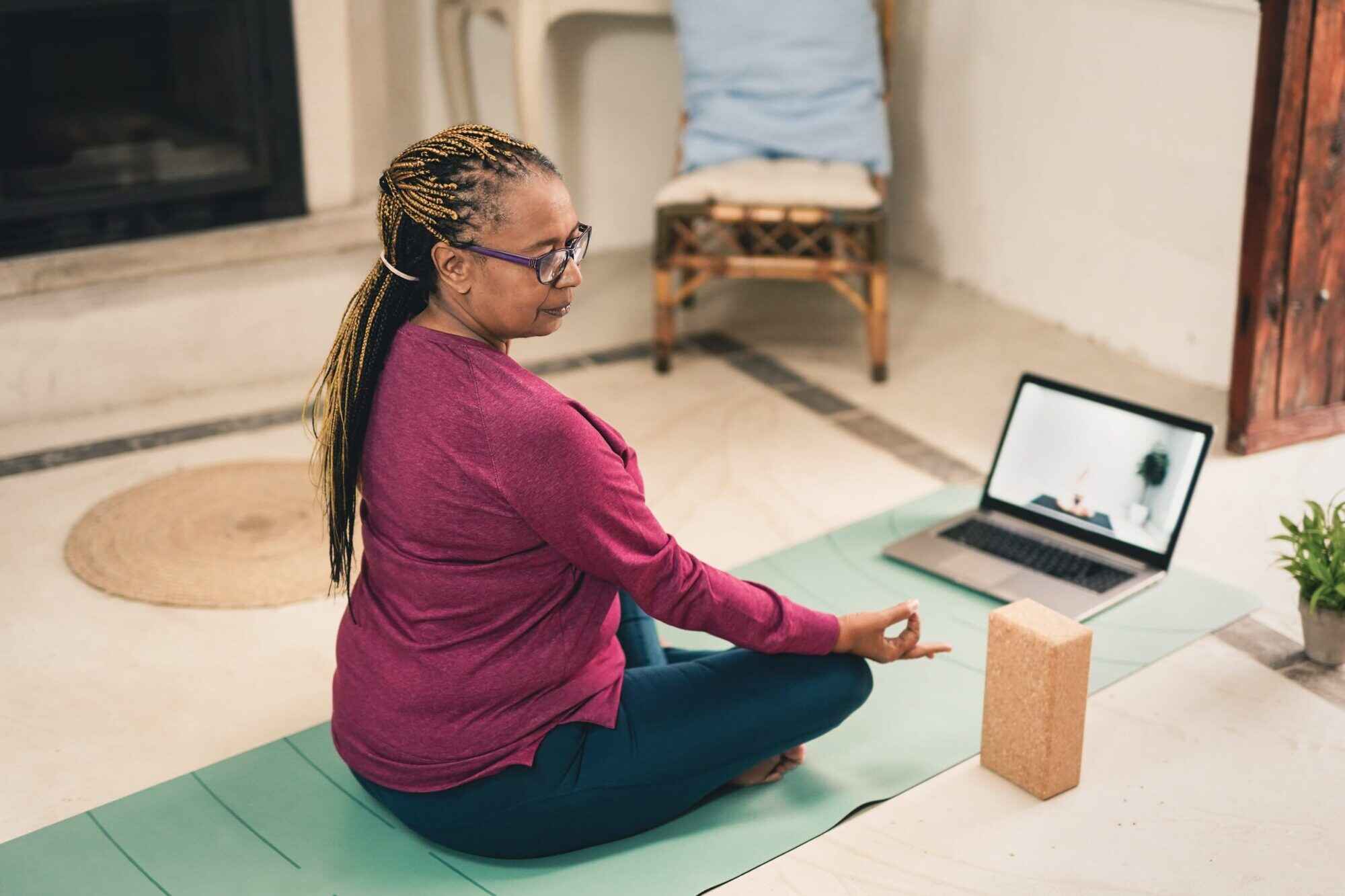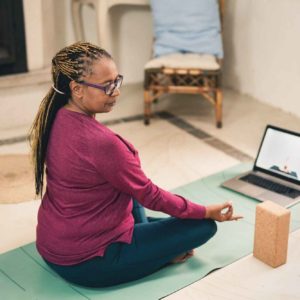
The golden years can be one of the most gratifying times in a person’s life. With no children to care for or jobs to rush off to, life should be easy and carefree. But this period can be challenging for seniors and their families. From financial concerns to decreased cognitive functionality, chronic pain, and serious health conditions, the unique challenges seniors face can be overwhelming. These troubling life changes can make a senior’s remaining days less enjoyable than they could and should be.
Incorporating mindfulness practices into your aging loved one’s routine can be a simple way to inject tranquility into a demanding day. Seniors who learn how to practice mindfulness can improve their mood and possibly ease any physical, emotional, and mental problems they may be experiencing. Read on to learn more about this beneficial practice and uncover techniques for increasing your loved one’s mindfulness that can positively benefit their daily life.
What is Mindfulness?
Mindfulness is the practice of being acutely aware of one’s environment and actions in the moment. It’s about slowing down and taking time out to observe thoughts and feelings without applying any judgments or criticisms. In doing so, one can feel more at peace and present in their current moment.
More than just a trendy buzzword, mindfulness can be a vital part of caring for you or your loved one’s mental and emotional well-being. But beware: debilitating conditions such as stress, anxiety, and other mental blocks can hinder one’s ability to achieve true mindfulness.
The ability to accomplish mindfulness entails applying key mindfulness practices to every aspect of life. Whether it’s a walk in the park or even just thinking harder about breathing habits, repeated adherence to mindfulness practices can be a boon for seniors. It can offer assistance toward attaining a greater sense of mental clarity and connectedness with their environment.
Why is Mindfulness Important to Seniors?
While mindfulness is valuable for people of any age, there are many health and wellness benefits particular to seniors that arise from engaging in mindful practices every day. For example, pain management and improved sleeping habits can be particularly beneficial for their overall health as they approach end-of-life.
Many seniors may have difficulty with physical exercise when naturally declining faculties impact their ability to perform more rigorous activities. As such, low-stakes mindfulness practices that many seniors are capable of can be an excellent way to experience the rewards of maintaining a sound body.
Seniors can see transformative improvements in their emotional well-being and mental cognition by incorporating mindfulness practices into their daily lives. Additionally, these techniques can help seniors overcome significant mental hurdles unique to older adults such as decreases in mental clarity, pervasive loneliness, and struggles with memory retention and recollection. The bottom line is that being actively mindful helps improve focus, creativity, and overall cognitive function, which can make a substantial positive impact on a senior’s emotional well-being.
Mindfulness Activities For Seniors
The senior in your life may have trouble seeing the benefits of mindfulness. You can help them by showing them what mindfulness can do for them. Then, encourage them to regularly practice mindfulness through simple techniques that are easy to accomplish on any given day.
Mindful Breathing
Breathing activities are a simple yet potent mindfulness practice that help moderate and soothe the heart rate. Mindful breathing can provide one with better control of their body and calm their mind when worries and stress take root. Here’s how to breathe more thoughtfully:
- Find a quiet, comfortable place.
- Close both eyes and note natural breathing rhythms.
- Breath in and out for several minutes at a time.
- Alter your breathing style to be slower and steadier.
- Increase the time spent mindfully breathing to experience more benefits, as comfortable.
Single-Tasking
Single-tasking is simple: it’s about focusing on one task at a time. Multitasking has become the de facto norm in modern lifestyles. Still, it can come at the expense of some of the most vital assets in our daily lives—our energy, and focus. Therefore, multitasking reduces our ability to be productive. Here’s how to be more productive and alert through mindful single-tasking:
- Set reasonable goals that can be attained by completing small, singular tasks.
- Carve out a dedicated space to accomplish the task at hand and eliminate distractions.
- Be mindful of breathing to focus deeply on a single task.
- If encountering distractions, breathe to recenter and focus on the task at hand.
Mindful Walking
Many seniors enjoy daily walks. Of course, much of their walking time may be spent fretting over some external problem. But with the proper practice, they can reduce negative distractions and take advantage of this low-impact exercise to enhance their overall mindfulness. Here’s how to walk mindfully:
- Be attentive to the sensations emanating from each body part.
- Consider the feeling of feet colliding with the ground.
- Think about the wind rushing against the face.
- Look around at what’s visible on a moment-to-moment basis.
- Smell the individual scents and how they combine into some particular aroma.
- Feel the sensation of touching objects along the walk.
Journaling
Journaling is an excellent habit for daily mindfulness. This thoughtful writing exercise encourages thinking more deeply about the ideas floating in your head. It can also help a senior escape that cloudy scatterbrain sensation we all contend with from time to time. Here’s why journaling can be beneficial to achieving mindfulness:
- Letting thoughts flow can activate the mind and “unclog” mental blocks.
- Journaling is a positive, empowering experience because there’s no “correct” way to do it.
- Journals provide safe spaces for expressing oneself without fear of judgment.
- Writing in a journal immediately upon waking up helps track goals, moods, and emotions.
Benefits of Mindfulness
By adhering to mindfulness activities, your senior loved ones can set the stage for a happier and healthier lifestyle—and on their own time to boot.
Improved Memory
Unfortunately, many senior citizens contend with decreased memory recollection. It can cause them to have significant difficulty being around loved ones or performing basic daily tasks. However, practicing sound mindfulness activities can help alleviate many problems seniors face due to memory loss, because mindfulness:
- Helps keep a senior’s brain more active and engaged to better process new memories
- Can maintain a senior’s ability to recall important memories
- Has been demonstrated to actually improve memory and cognitive function for older adults who have dementia and similar cognitive ailments
Provides Stress Relief
Stress is a common problem for seniors. Living on a fixed income can be stressful, especially for those who haven’t saved enough for retirement. This nagging tension can adversely affect a senior’s cognitive functionality, according to studies conducted by the National Institutes of Health. Worse yet, stress is linked to hypertension and heart disease, which are high-risk conditions for seniors. Actively seeking out mindful ways to mitigate stress such as deep breathing and thoughtful walking can benefit seniors by:
- Improving their mood and ability to think clearly
- Eliminating stress caused by confusion and uncertainty
- Reducing the potential for suffering from life-threatening physical conditions
- Combating the sources of stress directly enabling long-term physical and mental benefits
- Promoting a sense of personal empowerment through tailored stress management approaches to lift spirits
Stabilizes Mood
Seniors suffer from unique problems such as managing the family, preparing family finances, and contending with the end of life. These mood shifts may start small but can compound over time as one struggle leads to another to create a persistent sense of worry. After a while, the senior’s ability to think positively becomes significantly impacted. In response, seniors can introduce mindful activities into their routines to:
- Bring their mind in sync with their thoughts and surroundings.
- Stabilize and improve their mood to impart a greater sense of inner peace.
- Experience significant cognitive benefits, especially when combined with exposure to nature which studies show revitalizes the frame of mind.
As seniors engage in these mindful practices, encourage them to do some journaling so they can better understand what parts of their life tend to cause cognitive problems. Then, you can work with them to alter those behaviors or cut out the source of the issue to enable a more lasting shift in their emotional state.
Mindfulness for Seniors: Key Takeaways
Taking care of one’s physical, mental, and emotional health is one of the smartest investments people can make for their retirement. Daily mindfulness empowered by thoughtful actions can help seniors mitigate physical, cognitive, and emotional tensions. By encouraging a mindfulness practice, your loved ones can experience the profound benefits of reduced stress and improve their state of mind as they embrace their golden years.
It is never too late for prepare for a well-balanced retirement by ensuring you are living a life filled with purpose, health, and financial freedom but the sooner you get started the better. Doing all you can to eliminate financial stress will go a long way towards achieving peace and mindfulness. Strategies such as maximizing benefits from Social Security and Medicare or getting the most value out of assets like a home through a reverse mortgage or a life insurance policy through a life settlement can help people achieve this goal. To live the best possible retirement, strive for a balance between finances, health, and lifestyle.










